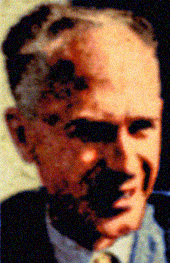Army reports position in Manzanar camp riot
…

By Ernie Pyle
WITH U.S. FORCES IN ALGERIA – The hardest fighting in the whole original North African occupations seems to have been here in Oran. Many of my friends whom I knew in England went through it, and they have told me all about it. Without exception, they admit they were scared stiff.
Don’t get the wrong idea from that. They kept going forward. But it was their first time under fire and, being human, they were frightened.
I asked an officer how the men manifested fright. He said, largely by just looking pitifully at each other and edging close together to have company in misery.
Now that the first phase is over, a new jubilance has come over the troops. There is a confidence and enthusiasm among them that didn’t exist in England, even though morale was high there. They were impatient to get started and get it over, and now that they’ve started and feel sort of like veterans, they are eager to sweep on through.
That first night of landing, when they came ashore in big steel motorized invasion barges, many funny things happened. One famous officer intended to drive right ashore in a jeep, but they let the folding end of the barge down too soon and the jeep drove off into eight feet of water. Other barges rammed ashore so hard the men jumped off without even getting their feet wet.
Ernie talks to Pittsburgher
It was moonlight, and the beach was deathly quiet. One small outfit I know didn’t hear a shot till long after daylight the next morning, but the moonlight and shadows and surprising peacefulness gave them the creeps, and all night, as they worked their way inland over the hills, nobody spoke above a whisper.
A friend of mine, Lt. Col. Ken Campbell, captured eight French soldiers with a pack of cigarettes. It was all accidental. He stumbled onto an Arab sleeping on the beach who told him there were soldiers in the building up the hill. Col. Campbell sneaked up, revolver in hand, and opened the door.
The soldiers were all asleep. With quick decision, he stuck the gun back in its holster, then woke the soldiers. They were very startled and confused. Col. Campbell speaks perfect French, so he passed around the cigarettes, chatted with the soldiers, told them they were captured, and after a bit marched them away.
Staff Sgt. Chuck Conick from Pittsburgh, telling me how the soldiers felt during that first advance, says everybody was scared but didn’t talk about that in the rest periods between advances. He says they mainly wondered what the papers at home were saying about the battle. Time after time, he heard the boys say, “If my folks could see me now!”
Staff Sgt. Conick, 25, is the son of Mr. and Mrs. M. C. Conick, of 1011 Portland St., East End. He is a graduate of the University of Pittsburgh Law School and was admitted to the bar shortly before he enlisted in the Army on January 15, 1942. As an undergraduate, he was a member of the Pitt hockey team and a skiing enthusiast.
French 75s uncannily accurate
All through the advance, the troops were followed in almost comic-opera fashion by hordes of Arab children, who would crowd around the guns until they were actually in the way. Soldiers tell me the Arabs were very calm and quiet and there was a fine dignity about even the most ragged.
Our men couldn’t resist the sad and emaciated little faces of the children, and that was when they started giving their rations away.
It got hot in the daytime, so hot that the advancing soldiers kept stripping and abandoning their clothes until some were down to undershirts, but at night it turned sharply chilly and they wished they hadn’t.
French resistance seems to have run the scale all the way from eager cooperation clear up to bitter fighting to the death. In most sectors, the French seemed to fire only when fired on. It has been established now that many French troops had only three bullets for their rifles, but in other places, 75mm guns did devastating work.
Our oldsters say they didn’t mind machine-gun and rifle fire so much, but it was the awful noise and uncanny accuracy of the 75s that made their hearts stand still.
The men who went through it have memories forever. Many say that, most of all, they remember little things of beauty like the hills shadowed in moonlight and the eerie peacefulness of the beach when they landed.
U.S. War Department (December 10, 1942)
North Africa.
There was little activity, except patrolling in the forward areas yesterday because of rain which has made much of the terrain impassable.
Our aircraft bombed a small enemy column in the southern sector.
The Pittsburgh Press (December 10, 1942)
Over 400 Japs die on coast of New Guinea; 10 Zeros downed
By Brydon Taves, United Press staff writer
…
Allied nutcracker drive being prepared
By Edward W. Beattie, United Press staff writer
…
Chungking, China –
The Japanese have started large-scale roundups of British and U.S. nationals in Shanghai and more than 1,500 have been sent to a concentration camp at Pootung, dispatches said today.
By Fred W. Perkins, Press Washington correspondent
….